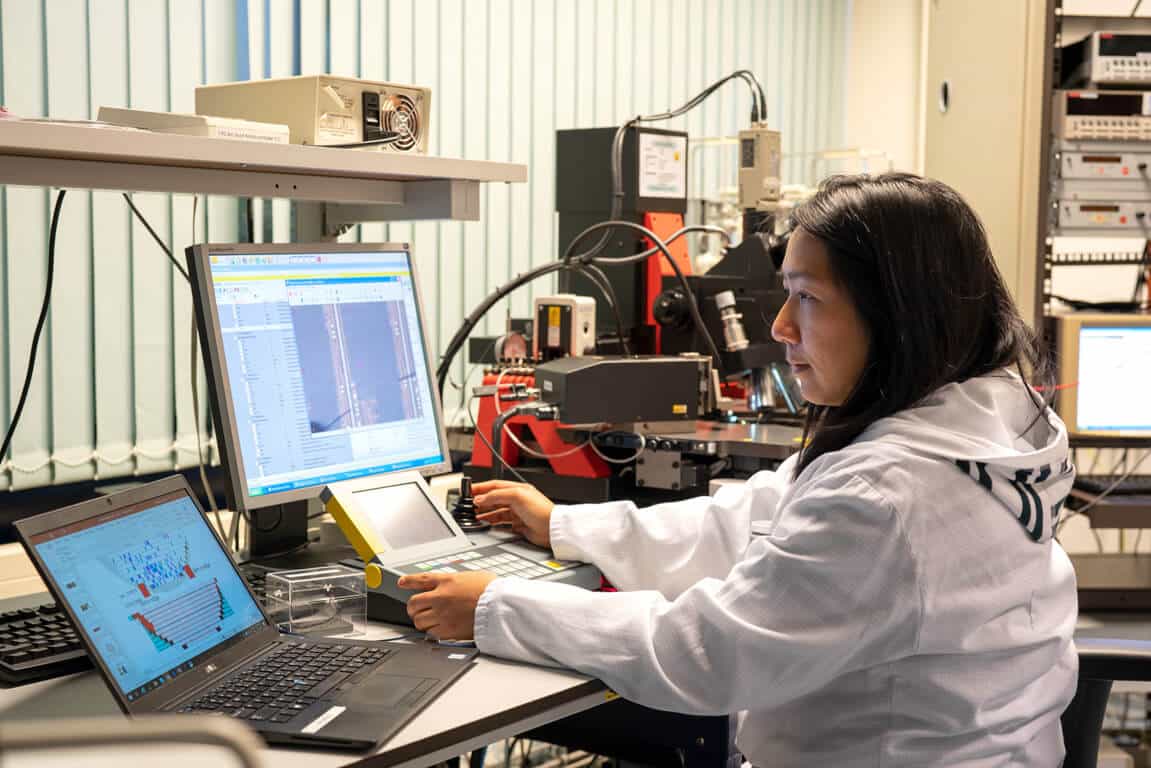A balanced mixture between interactive lectures and small exercises. Course material: lecture notes.
Integrated circuits (ICs) are integral part of any electronics system we see around. While the continue scaling of transistor feature sizes has been enhancing the chip density, the complexity of new generations of VLSI chips have been increasing; we already reached the point where billions of transistors are integrated on a single chip. Developing, designing and manufacturing of such chips are not only very complicated and time consuming, but also prone to defects; these may due to several deficiencies in the original silicon and in the manufacturing process. To guarantee the customers satisfaction, semiconductor companies have to ensure the required product quality and reliability of the manufactured chips through testing (e.g., at wafer level and after packaging). Moreover, It has been shown that tackling problems associated with testing VLSI chips at earlier design stage levels significantly reduces the testing cost. Thus it is important for hardware designers to be exposed to concepts of VLSI testing which can help them design better products at lower cost. Hence, appropriate test development is of key importance not only to ensure the customer satisfaction, but also to optimize the test cost.
This course covers the fundamentals of IC test and Design-for-Test; it introduces the participant to the field of digital systems testing and associated aspects. The participant will learn that ensuring customer satisfaction needs appropriate countermeasures to be taken, both during the design phase (i.e., part of the design), but also after manufacturing, and even in field/ during the lifetime of the application (i.e., continue monitoring and acting when needed). The course will teach the participant how to guarantee that a chip that may consists of billions of transistors and connections can be tested in e.g., less than one second, how to ensure that the lifetime of the chip is 10 years rather than 2 years, etc. Topics that will covered include: importance of VLSI test, test process and Automatic Test Equipment (ATE), defects and fault modelling, Fault simulation, Testability Measurements, Combinational Circuit Testing, sequential Circuit Testing, Memory Testing, Design for Testability, Scan Design, Boundary Scan, Built-in-Self Test, Delay Test, Current Testing, IC reliability, etc.
The presenter of this course is a world-renowned speaker in the field with broad scientific and industrial experience. The speaker has presented his course material at many international conferences, as well at leading semiconductor companies (in Asia, USA, and Europe).
This training is available for open enrollment as well as for in-company sessions. For in-company sessions, the training can be adapted to your situation and special needs.
Objective
After the course, the participant will:
- understand the importance of VLSI testing and reliability, its impact on the total cost and the quality of the designed product;
- be aware about the different testing stages and types;
- have a good understanding of the functions of IC test equipment and its main components;
- be able to describe the silicon/ transistor/ interconnect defect mechanisms and their associated fault models, and how they can be tested;
- examine different test methodologies for logic/sequential circuits and (embedded) memories, their advantages, disadvantages, cost, limitations, etc.
- analyze different “Design-for-Testability DFT” methodologies, their advantages, disadvantages, cost and limitations
- develop test solutions for defined faults models for logic circuits, sequential circuits and (embedded) memories; and make a reasoned choice from available tests and Design-for-Test techniques;
- better understand the “weaknesses” of digital systems regarding test and reliability;
- become a better VLSI designer, a better test engineer/ product engineer;
- be able to follow other IC test courses and tool trainings more effectively.
Target audience
This course is intended for those involved in the design and/or testing of digital integrated circuits and memories: Digital/memory IC design engineers, test and product engineers, fab engineers, test engineers, starting DfT engineers. Also: test researchers, test methodology developers, test tool developers and their managers!
Required background knowledge:
- Educational level: technical college / university in Electrical engineering, Computer, engineering or mathematics;
- Basic of digital synchronous IC design and manufacturing;
- Recommended: Several years of industrial practice.
Program
- Introduction to IC Test and Reliability;
- Test Execution: VLSI Test Process and Test Equipment;
- Fault (and Defects) Modeling;
- Fault Simulation;
- Testability Measurements;
- Combinational Circuit Testing;
- Sequential Circuit Testing;
- Memory Testing;
- Design-for-Testability: Scan Design;
- Design-for-Testability: Built-in-Self Test;
- Design-for-Testability: Boundary Scan;
- Special/ Advanced tests;
- IC Reliability: defects, models and test approaches;
- Modular (Core-Based) SOC Testing;
- Future trends and challenges in IC Test and Reliability.
Methods
Certification
Participants will receive a High Tech Institute course certificate for attending this training.
Course Reviews



